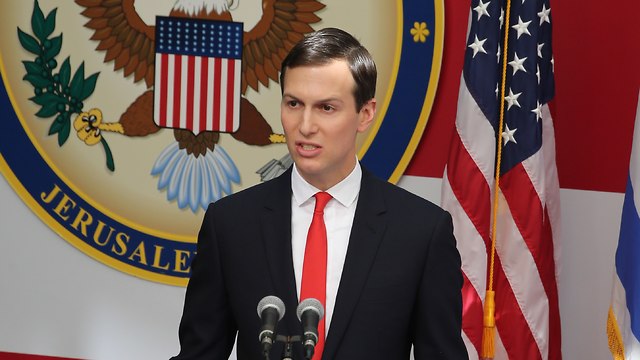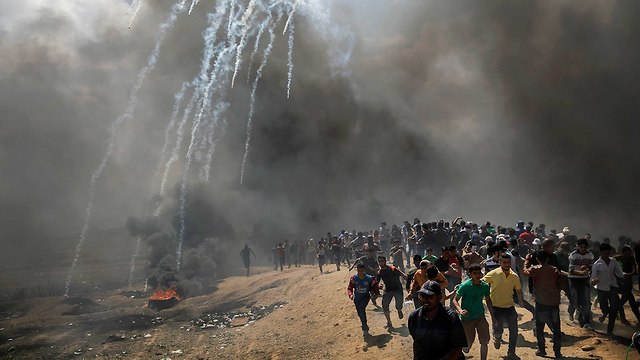
What does Israel want to achieve in Gaza?
Op-ed: The defense establishment keeps asking, directly and indirectly, what is the government’s immediate goal and strategic goal? We know what the government doesn’t want, but the Gazans are already on the fences, and the government must provide a rational, planned and clear answer—what now?
For a moment, we were able to celebrate. The first round against Iran in Syria ended with an IDF victory.
Prime Minister Benjamin Netanyahu got a silent acquiescence
from Moscow for Israel’s operations against Tehran’s influence.

At the same time, US President Donald Trump delivered a speech that not only canceled the nuclear agreement, which most Israelis were against, but also allegedly announced the United States’ return to the Middle Eastern arena.
At the same time, Netta Barzilai won the Eurovision—possible proof of the Israel boycott movements’ failure and a display of proud Israeli normality.
And for dessert, we got the opening of the American Embassy in Jerusalem—an Israeli consensus since the days of David Ben-Gurion.
And then they returned. The ultimate “they.” The repressed, the rejectionists, the miserable—and the enemies Israel would like to forget. For a historic second, Israel was able to ignore the elephant in the room. But you can’t really erase the bitter pieces of reality, the reason a Saudi embassy hasn’t opened, Israel’s main long-term challenge, the story Israel has been living with since the day it was established.
During the opening ceremony of the US Embassy in Jerusalem on Monday, the president’s advisor, Jared Kushner, expressed a desire for peace. But Gaza didn’t really exist there. Neither did the Gaza vicinity communities, whose fields are being burned as they watch thousands trying to break into their territory as if they weren’t part of the story. After all, it’s the Gaza vicinity residents who are in danger. There was nothing to say about the dozens of dead Palestinians either. It’s as if they came from a completely different world.
Gaza is controlled by a cruel, fundamentalist regime, which is abusing its citizens and waging a malicious campaign for a conflict in the strip. This situation is Hamas’ fault. But there are about two million people living in Gaza, on the verge or in the middle of a humanitarian crisis. There is not enough clean water and electricity, there is no work and no future. This hasn’t been determined by the United Nations, but by our own defense establishment. Only a blind person fails to see the connection between the despair in the strip and Hamas’ ability to urge tens of thousands to risk their lives on the fences.
What does Israel want to achieve in Gaza? What is the immediate goal and what is the strategic goal? The negative scenario the IDF has been dealing with since the 1990s—attempts to launch mass marches towards the Israeli territory—is already materializing. The result is materializing too: Extensive live fire, dozens dead and thousands wounded.
The defense establishment is asking repeatedly, directly and indirectly, what does the government want to achieve there. We know what the government doesn’t want: It doesn’t want a hudna, a reoccupation, a seaport; it doesn’t want aggressive acts to topple Hamas; it doesn’t want the international community to get involved; and it doesn’t want a military operation, unless the other side fires the first shot. The Gazans are already on the fences, and the government must provide a rational, planned and clear answer—what now?

Jared Kushner at US Embassy opening. Will Trump keeps his promise to reach ‘the deal of the century’ too? (Photo: Amit Shabi)
We can enjoy the embracing American support and the wave of Israeli successes. But when this success is at its peak, we should be cautious, accurate, and remember the lessons of the past. We should especially look at the cracks revealing opportunities and dangers.
We can dance and celebrate the Eurovision at Rabin Square and imagine that history and its complexity have been pushed aside for good, but they haven’t—and the Palestinians are still there. There’s no partner. Hamas is Islamist and suicidal, and we have cut all ties with Palestinian President Mahmoud Abbas since his anti-Semitic speech.
But what does Israel want? Why it’s stronger than ever. So what now? Some will say an iron wall until Hamas collapses in the strip. But that’s a decision in itself, which could lead to undesirable results. If Hamas falls, the responsibility for Gaza may be handed over to Israel, as there is no legitimate Palestinian Authority at the moment as far as Jerusalem is concerned. Passively waiting on the fence for Hamas to fall could take a long time, and the situation in the strip could worsen, its residents’ suffering under Hamas could increase, and so could the acts of terror.
And one last thing: A lot has been said in the past few days about President Trump keeping his promises. We should perhaps listen to the message conveyed by his son-in-law, Kushner, about the plan to reach an extensive peace deal. This message is a direct continuation of Trump’s promise to try to reach “the deal of the century.”
Nadav Eyal is Channel 10's chief international correspondent.

Gazans riots near border fence, Monday
Photo: AFP

Nadav Eyal
מומלצים
















